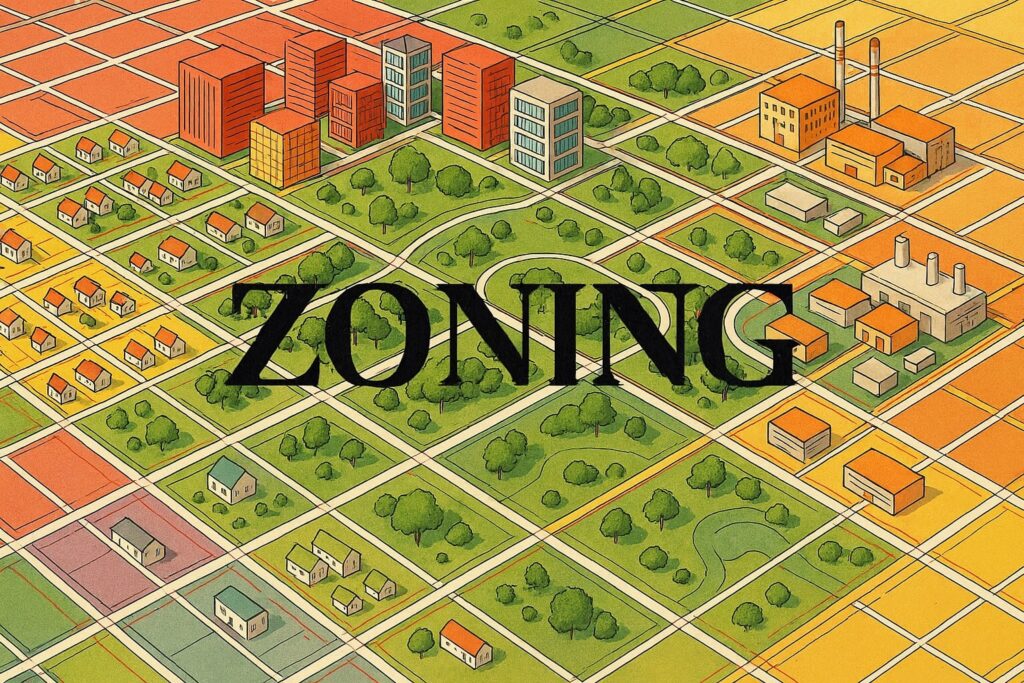Written By: MA Sadik, Commercial Real Estate Intern, 2025
Zoning is a foundational concept in real estate development that directly affects what can
be built on a piece of land, how it can be built, and what it’s ultimately worth. For anyone
involved in land use—from investors to developers to policymakers—understanding zoning
is essential to making smart, legally sound, and profitable decisions.
What Is Zoning?
Zoning is a set of local government regulations that divides land into specific districts—
such as residential, commercial, industrial, agricultural, and mixed-use—each with its own
rules. These rules govern what kind of structures are allowed, how large they can be, how
tall they can be built, how close they must be to property lines (setbacks), and even how
many units can be built per acre.
The purpose of zoning is to organize city development in a way that promotes safety,
sustainability, economic vitality, and compatibility among different land uses. For example,
zoning helps ensure that a noisy factory isn’t located next to a residential neighborhood or
that there’s enough infrastructure to support dense developments.
Why Zoning Matters for Land Development
1. Determines What You Can Build
- Before breaking ground, developers must check the zoning code to confirm if their
proposed use is permitted. A retail plaza can’t be built on land zoned only for residential
use without seeking a zoning change.
2. Impacts Property Value
- Zoning heavily influences market value. A parcel zoned for commercial use often carries
higher value than one restricted to low-density residential. Rezoning a property can
significantly increase its development potential and resale price.
3. Shapes Design and Cost
- Zoning laws dictate design parameters such as maximum height, building size, density, and
parking space requirements. These affect construction budgets and potential revenue. A
taller building with more rentable square footage may be allowed in one zone but restricted
in another.
4. Affects Financing and Approvals
- Financial institutions evaluate zoning when approving loans. If a project doesn’t comply
with zoning regulations, it’s considered riskier and harder to finance. In many cases,
variances or rezoning must be secured before funding can proceed.
5. Influences Project Timeline
- Securing zoning approvals can take months and involve public hearings, environmental
studies, and planning board reviews. Failing to plan for zoning can delay construction and
increase holding costs.
Navigating Zoning Challenges
To successfully work within zoning constraints, developers should:
- Conduct early due diligence by reviewing zoning maps, codes, and future land use plans.
- Engage professionals such as land-use attorneys, planners, and engineers.
- Apply for variances or rezoning if the land’s current use doesn’t support the project.
- Monitor community feedback, as local opposition can impact approvals.
Conclusion
Zoning is not just a regulatory box to check—it’s a critical element of development strategy.
It determines what is possible, profitable, and permissible. Whether you’re building a
shopping center, housing complex, or industrial facility, zoning is the first thing you should
understand and evaluate.
By learning how zoning works—and how to work with it—you’ll be better prepared to turn
land into opportunity, avoid costly delays, and unlock long-term value from every project.
The post Understanding Zoning: Why It’s Critical for Land Development first appeared on M Square Commercial.
The post [#item_title] first appeared on M Square Commercial.


